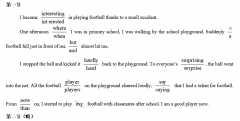2016惠州二调英语试题及答案
2016届高三惠州市第二次调研考试英 语
第I卷
第一部分 阅读理解(共两节,满分40分)
第一节 (共15小题;每小题2分,满分30分)
阅读下列短文,从每题所给的四个选项(A、B、C和D)中,选出最佳选项,并在答题卡上将该项涂黑。
A
Failing in something isn’t a really nice feeling, but Scotland’ s Fettes College in Edinburgh wants to show its students that failure isn’t something to fear and is actually something to accept willingly!
The boarding school held “failure week” to celebrate taking risks and learning from them. Whether in sports or school, children often face lots of pressure to succeed and do well, and the school was becoming concerned.
“Young people from all walks of life live in a high-pressure environment where they are trying very hard to achieve a level of perfection,” said Sue Bruce, head of personal and social education in the school.
“This week at Fettes we have been focusing on one of the most misunderstood parts of success: failure. While we are often scared of failure, it is important to learn that it is only through failing, often many times, that we learn how to succeed. All through the week, we have looked at the experiences of some of the most successful inventors, artists and businessmen, who failed hundreds, if not thousands of times on their journey to success,” read a letter on Fettes College’s website.
To celebrate failure, students were encouraged to try something they’ve never done before, like playing an instrument or dancing in front of audiences. A number of students stepped up and tried things that they finally failed in, but they had fun and enjoyed the experience. “The concert was extremely enjoyable, proving that we should always try not to worry about failure and have a go!” read another note on the website. Students were also taught about famous people like J.K. Rowling and Richard Branson who failed many times before they finished what they set out to do.
“If they let the fear of failure stop them from doing something, they are actually stopping themselves from learning, developing, and potentially succeeding,”said Bruce.
1. What is the purpose of the boarding school to hold “failure week”?
A. To get the students involved in social activities.
B. To help the students accept and learn from failure.
C. To make the students study even harder.
D. To teach the students how to get relaxed.
2. During the “failure week” the students could do the following things EXCEPT ___________?
A. taking risks B. learning from others’ experiences
C. trying something new D. trying to entertain themselves
3. What can we learn from the passage?
A、Many successful people are lucky and achieve success easily.
B、Because we are often scared of failure ,we never succeed.
C、The fear of failure can stop the students from learning and succeeding.
D、The students who failed in trying new things felt depressed.
B
Humans have been keeping animals as pets for tens of thousands of years, but Dr Jean-Loup Rault, an animal scientist at the University of Melbourne in Australia, believes new companions are coming: robot pets.
“Technology is moving very fast,” Rault told ABC News, “The Tamagotchi in the early 1990s was really the first robotic pet, and now Sony and other big companies have improved them a lot.”
This may not sit well with pet lovers. After all, who would choose a plastic toy over a lovely puppy? But Rault argues that the robotic kind has a lot going for it: “You don’t have to feed it, you don’t have to walk it, it won’t make a mess in your house, and you can go on a holiday without feeling guilty.” The technology also benefits those who are allergic to pets, short on space, or fearful of real animals.
It’s not clear whether robot pets can replace real ones. But studies do suggest that we can bond with these smart machines. People give their cars names and kids give their toy animals life stories. It’s the same with robots. When Sony stopped its repair service for its robot dog Aibo in March 2014, owners in Japan held funerals.
As an animal welfare researcher, Rault is concerned about how robotic pets could affect our attitudes towards live animals. “If we become used to a robotic companion that doesn’t need food, water or exercises, perhaps it will change how humans care about other living beings,” he said.
So are dogs and cats a thing of the past, as Rault predicts? For those who grew up with living and breathing pets, the mechanical kind might not do. But for our next generation who are in constant touch with smart technology, a future in which lovely pets needn’t have a heartbeat might not be a far-fetched dream.
4. What does the underlined phrase “sit well with” means?
A. be refused by B. be beneficial to
C. make a difference to D. receive support from
5. What are the advantages of robot pets?
a. They are plastic and feel smooth.
b. Owners needn’t worry about them when going out.
c. They can help cure allergies.
d. They save space and costs.




